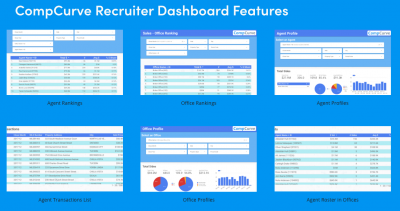In a recent live conference call, hosted by real estate publisher, Propmodo, a few forward thinking minds in property data gauged their predictions on future progress in data transparency and digital access in the real estate biz – anticipating progress, yet at varying speeds.
The two guest participants, Reonomy CEO Richard Sarkis and Estated CEO Joshua Fraser (disclosure: I work for him), discussed the data challenges being faced currently in the world of real estate technology in a 35 minute session moderated by Candyce Edelyn of PropelGrowth and Franco Fraudo of Propmodo
 This call focused on the topic of data accessibility, one of 9 prevalent topics at the forefront of the built environment chosen by Propmodo as part of their 2019 Metatrend series, which includes special feature editorials, events and facilitated discussions.
This call focused on the topic of data accessibility, one of 9 prevalent topics at the forefront of the built environment chosen by Propmodo as part of their 2019 Metatrend series, which includes special feature editorials, events and facilitated discussions.
Data accessibility focuses on how we get more data into the hands of those who need it.
Thanks to digitization and new players focusing on data aggregation, access is accelerating faster than ever. By continuing to focus on standardization, enhanced usability of the data once accessed will provide a new level of capabilities for companies who intend to make their mark in the largest asset class in the world.
While leading the charge at Estated, a public record aggregator, Fraser has learned a bit about the hurdles of collecting and processing the massive amounts of source data available across the U.S. He chuckles at the fact that some sources still send him CD-ROMs housing the data, painting a picture of the portion of manual data collection that still exists in this digitized world. Nevertheless, Fraser is confident that we are just a few years off from having this data fully aggregated and accessible, providing the foundational layer needed to support the next benchmark –– standardization.
Both Sarkis and Fraser have their doubts about the likelihood of a real estate standard being implemented anytime soon, however, given how the industry operates.
Sarkis pointed out that there are companies making progress in pockets and in regions, but looking at a nationwide scale brings up too many questions around who is going to be responsible for driving adoption and implementation.
Candyce Edelyn also contributed a unique perspective to the conversation. Coming from a background in securities and trading, she referenced the implementation of a standard decades ago as a catalyst for a huge leap forward in that industry –– which was prompted not by a standardizing body, but by the largest companies coming together in order to make their businesses better, which included their bottom line.
So could the same approach work in the real estate market?
It’s not likely, due to a massive amount of privatization and a lack of financial incentive.
Lack of financial incentive
As demonstrated in the securities example above, change was made because it was in the best interest of corporations who could prompt and drive adoption. Sarkis makes the point that in real estate, there is still power in holding proprietary data and there is not yet enough of an incentive for these companies to relinquish it.
This is where we see the game of tug-of-war between a financial incentive for specific companies over the good of participants throughout the entire industry.
Edelyn drove the point home that transparency is essential to efficient markets and getting vendors and industry participants involved can be a reason for broad adoption of a standards body –– and they have a lot to gain –– given the potential for interoperability with the data. Success with standards implementation means that the data will no longer be held hostage in silos from one company to another and businesses will work better together, improve customer services, and ultimately cut costs if they can make better data-driven decisions.
Privatization
Associations such as the MLS and NAR are huge influencers that don’t have the same use cases for interoperability as other businesses in the industry.
The MLS is relied upon by brokers and agents for data, not in need of it. Though these organizations serve the industry, they are certainly not in a position to be severely influenced by industry shifts –– they hold the power to cause these shifts. And though as Fraser points out, the number of MLS entities nationwide has significantly declined in recent years as they choose to work together and join together, they are still influential individual players that will have decision making power regarding the future of data standardization in real estate.
There are many reasons why standardization in the industry would be beneficial and businesses and associations like RESO are making strides because of this. The complexity of players involved, however, makes the project of standardization more like a puzzle than a board game –– each piece that makes up the industry must come together, there is not one path to be taken for each player from start to finish. Where and how these players are going to come together is still to be determined.
Finding the right way to shape the benefit of a real estate data standards for each player involved is the magic key to what so many are craving for in this industry.
When and why do you think the tables will finally turn?
The post Estated and Reonomy CEOs agree –– data digitization, not standardization in the near future appeared first on GeekEstate Blog.
from GeekEstate Blog https://ift.tt/2BPQvgB
 Photo by
Photo by  Photo by
Photo by  Photo by
Photo by 
 Photo by
Photo by 


 Photo by
Photo by  In our latest real estate tech entrepreneur interview, we’re speaking with Eric Tseng from
In our latest real estate tech entrepreneur interview, we’re speaking with Eric Tseng from 
 Thanks to Eric for sharing his story. If you’d like to connect,
Thanks to Eric for sharing his story. If you’d like to connect, 

 This call focused on the topic of
This call focused on the topic of  Combining big data and artificial intelligence,
Combining big data and artificial intelligence,  Photo by
Photo by  Photo by
Photo by 








 In our latest real estate tech entrepreneur interview, we’re speaking with Adam Blake from
In our latest real estate tech entrepreneur interview, we’re speaking with Adam Blake from  Zego has set the standard for the “resident app” in apartment communities. We have created the first all-in-one mobile solution that integrates smart home technology, communication, rent payment, work orders, local services, and more into a single app. Until now, these technologies and capabilities either didn’t exist or were spread across disparate systems: email, text, web portals, smart home apps, etc.
Zego has set the standard for the “resident app” in apartment communities. We have created the first all-in-one mobile solution that integrates smart home technology, communication, rent payment, work orders, local services, and more into a single app. Until now, these technologies and capabilities either didn’t exist or were spread across disparate systems: email, text, web portals, smart home apps, etc.
